
Massive open online courses (MOOCs) are growing in number rapidly and redefining online education.
A MOOC is not a traditional online course. MOOCs are designed to engage students with easy to use features and video lessons. Most MOOCs are free, and according to the New York Times they are simple to join.
“I made my account in seconds and I was able to get started immediately,” MOOC user and NYU freshman Olivia Jang said in an interview with JSR.
Jang says that MOOCs help her study for her regular classes. “I’m reviewing my sciences and math with MOOCs,” she stated, “but I’m also able to access and study my world and European history.”
MOOCs are available to students across the world. According to Yahoo! News, these courses have not had the biggest impact on college students like Jang but on older people and others who are not enrolled in school.
Colleges such as Harvard University, MIT, University of Texas and CalTech have contributed large amounts of money to develop MOOCs. EdX, developed by Harvard and MIT, is one of the world’s largest MOOC providers. Stanford and Princeton started Coursera, another favorite.
“The fact that these top-notch universities are developing such a free and accessible tool for learning is amazing,” Jang said. “It’s also unbelievable, especially when we live in an era where paying college debts can take a lifetime.”
However, some critics are not so enthusiastic.
According to Yahoo! News, professors at Amherst University voted against implementing MOOCs in fear that the professors will become no more than “glorified teaching assistants.” Others have argued that the positive connection and harmony between a student and teacher disappear online because professors will not have a chance to become personally acquainted with students and advise them.

